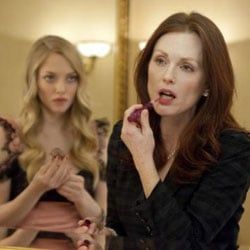Interview: Chloe's Julianne Moore

Is there anything Julianne Moore can’t do? She’s starred in a soap opera, done some comedy, a little action and pushed the limits with a number of fairly controversial roles. Moore’s character in Chloe falls into the latter category. Catherine is in the middle of her life and struggling as the things she once loved are losing their vibrancy, particularly her marriage.
When she’s almost sure her husband, David, (Liam Neeson) is cheating on her, she makes a deal with a young prostitute named Chloe (Amanda Seyfried). Chloe attempts to seduce David on several occasions and reports back to Catherine with the details. Catherine quickly becomes conflicted eager to end the arrangement, but caught in the middle of the troubling discoveries and her own atypical intrigue.
Sounds like a classic story of amour, right? Okay, the prostitute thing may push Chloe into more divisive territory, but the element that solidifies it as a film that could suffer from backlash or gain admiration, depending on your taste in this type of material, is the girl-on-girl action. Yes, if you know just one thing about Chloe, it’s probably that it involves Moore and Seyfried getting a little naughty.
Not sure how you feel about that? Perhaps Moore can elucidate on that issue more eloquently than I have. Check out what Moore had to say about her moment with Seyfried, as well as her experience working with Neeson and director Atom Egoyan.
What’s the significance to you of choosing material that challenges the mainstream view of sexuality?
That’s hard. [Laughs] I don’t particularly choose material based on that tenet. I basically just choose stuff based on story. And if the story is compelling – I like behavior, I like relationships. At a certain point in my career I realized that most of my movies are about relationships. I do think that at the end of the day, that’s really all that matters, who we know, who we love, who we spend time with. Zadie Smith said something really interesting in her new book on – what’s it called? It’s the one with all of the essays of criticism and stuff like that. In the chapter she did on acting, she said that there was an actor that was dismissed as a family film actor as if it was nothing, as if family wasn’t the major narrative in our lives. I thought, wow, that’s fantastic because that’s how I feel too. You’re family and the people you marry and your friends; that’s the narrative, that’s the big story. So I’m always drawn to material that’s really about relationships.
But you can’t deny that your roles are primarily not conventional.
CINEMABLEND NEWSLETTER
Your Daily Blend of Entertainment News
I’ve made 50 something movies. If you took a look at them, there would be some that are outside the mainstream, but then there’d be some that are inside the mainstream. The funny thing about my films is that you can make little piles of them. You could make little piles of the movie that were family movies, you could make a little art movie pile, you could make a little action movie pile.
Can you tell us about working with Liam and what he brought to this film?
He’s an amazing actor. He has a unique combination of being somebody who seems extremely emotionally nuanced and also highly masculine at the same time, which is something you really needed for this role. [Screenwriter] Erin [Cressida Wilson] talked about that in one of her interviews, that producers kept pushing her to have more scenes with him talking to friends. She’s just like, ‘No, no, no. You can’t do that. He needs to be this kind of loose figure.’ He’s there and you keep remembering and she keeps yearning for him, but he’s not present in that way. We don’t know what he’s thinking. We don’t know where he is. And Liam is somebody who’s uniquely able to do that because of his vague emotional size.

And how about Amanda?
Amanda too was very lovely. The thing that impressed me the most about her was how incredibly receptive she was and present as an actor. She never got ahead of the material. Everything we had to do was very nuanced and slow. It’s about people kind of building trust in each other and allowing each other to take this pretty far, but take it one step at a time and she never got ahead of the material ever. She was always very very present, like I said, very receptive, very much available too, which was quite impressive to me.
Erin said she wrote Catherine with you in mind. Did you know that before officially signing on?
I had no idea. She told me that much later. She told me that on the set. I was like, ‘What? Really?’
When filming the sex scene with Amanda, was there anything you did differently to prepare compared to other sex scenes you’ve done in the past?
There was nothing different that I did to prepare than I do to prepare for any other intimate scene, if that’s what your question is. Do you mean was it different because it was a girl?
Well, not necessarily.
Are you writing for a woman’s magazine? [Laughs] Whenever you have an intimate scene with something you’re very very prepared no matter what it is. Everyone knows exactly what’s happening, it’s usually very choreographed. If you’re lucky, you’re very familiar with the actor by the time you shoot it. Amanda and I had been working together and had done most of our stuff at that point, so we were comfortable with each other. Atom was very particular about how he’s going to shoot it. We knew where the camera was, we knew how many shots there were, we knew how many setups there were. So that’s kind of what you do to prepare, just to make yourself comfortable.
What was it about Catherine that you identified most with being a wife and mother?
I identified with the fact that she’s been married for a long time. So many movies are about getting married. Like, ‘Oh! I’m going to meet this guy and oh, is he going to ask me to marry him, oh, he did, we got married, the end!’ In life, marriage is long and complicated and that’s just the beginning and after a while you barely remember the beginning. Like, ‘When did we meet? Was it 14, 15 years ago?’ You don’t know anymore and that’s the least of it. The idea that this is a woman who is in this middle of her life and in the middle of her marriage and suddenly found herself struggling with it, thinking about it, it was really novel. I just don’t think you see it very often and I was very compelled by it. Liam and I have this scene in the car where I’m asking him some questions and it quickly escalates into a fight and Atom hadn’t envisioned it that way and neither had we and it just turned into a fight. And he was like, ‘That’s was interesting.’ And we both were really pleased with it because that’s kind of – nobody means to fight. You don’t mean to, you do it, you say something and suddenly you’ve fought and then you’ve ruined the weekend and that’s it and you’re like, ‘How do I recover from this fight? How to we do it?’ The fact that that dynamic was so preset that these people were people who wanted to be together, wanted their marriage to work, but were stuck.
You’re kids are young, but did you get any insight into dealing with a child growing up?
Catherine complains about her son, but she’s not allowing him to grow up. She’s trying to put him back into a child box when he’s in a teenage place. So I wouldn’t say, ‘Oh look, he’s just a typical teenager.’ I would say, ‘Well, there are two sides to it and I don’t think she’s particularly allowing him to be who he is.’
How did Atom’s direction compare to other directors that you’ve worked with?
I think that he particularly is someone who’s really interested in the subtlety of human behavior and he’s also aware that - just how we communicate and the fact that what we’re saying, the language we’re using is not always what we’re communicating. It sounds simplistic to say it, but so often in film everyone has the expectation that what an actor is saying is what they mean, when in fact, life is rarely that way. Did you guys see The September Issue? Well, I mean, my god! The behavior in that was phenomenal. I was so excited to see it because you don’t get to see that kind of tension and that kind of sublimated rage and desire and all this kind of stuff [whispers] where everybody’s talking like this. I just saw a play recently and everyone was yelling and my friend, who’s not an actor, said to me, ‘I never yelled that much in my life.’ I said, ‘I know. People don’t yell.’ People really don’t. But Atom is someone who kind of understands that a lot can inspire very little and what you’re saying does not always correspond with what you mean. So all of that complexity, he’s a master of.

What was the most challenging aspect of this role?
Keeping it within the balance of normal behavior. If you try to one line this movie, it’s about a woman who hires a prostitute to follow her husband to find out if he’s cheating. It’s like, ‘Oh yeah, that happens all the time.’ When you do that, you get outside of it and then it stops being meaningful. You have to be inside of Catherine all the time, so that every time she meets [Chloe] and she goes, ‘Okay, we’re going to do this one more time. Okay, one more time,’ each step feels like tragedy inevitable. You can see it, you know it’s coming, but you know she has to take this - so that’s the most challenging thing to keep in line.
You always have a ton of films in the works. So, what do you have coming up that you’re most excited about?
Well, if you’re reading IMDB, half of it’s made up. You can’t trust it or Wikipedia, which is just lies, lies! I have this movie and I have Lisa Cholodenko’s movie coming out, The Kids Are Alright. I’m finishing 30 Rock and then I’m going to do my husband’s movie this summer and then maybe something else that I haven’t finished negotiating.
And what about your return to the As the World Turns?
I did it already. I did it, we shot it, I don’t know when it airs. They asked me to come back because they’re going off the air. It was nice to be able to go back and they’re people that I cared about on that show and to say hello and - goodbye. It was nice to see them.
Has the dynamic between you and Bart changed at all? When he writes something, are you #1 on his list?
I don’t know. It’s interesting because he was going to do this one project at a different time and when I was not going to be able to do it, I was going to be working on something else, and then his time ended up changing and I was like, ‘Well, why don’t we do it when it’s warm, in the summer and then we can all do it together?’ So I think that we still think of things that way, but I also don’t feel like he has to do it. He doesn’t have to think of me for stuff, but it’s also nice to work together. So, no, it probably hasn’t changed much.
What does he get out of you that no other director can?
Accessibility! He has access. I know this because I’m married to a director and sometimes it’s impossible to get to actors. They always feel like there’s all these steps to take, because I’m always like, if you can get to somebody and half of the time actors will do it. They’ll go, ‘Yeah, sure. I’ll do it.’ It’s just hard to get to them.
Staff Writer for CinemaBlend.
Most Popular





